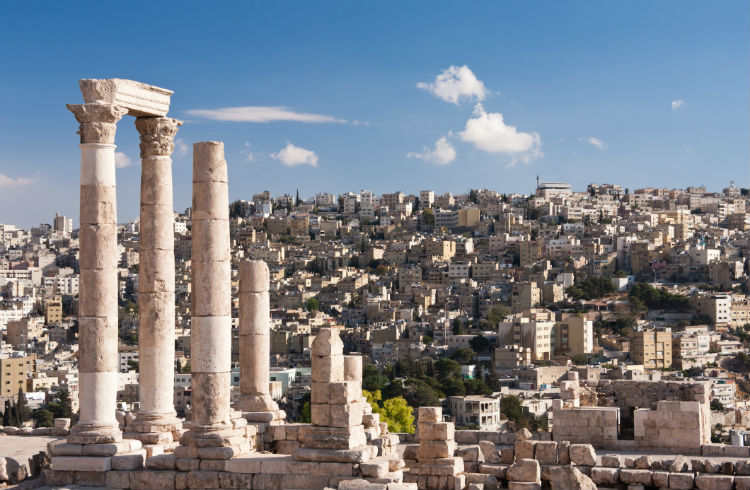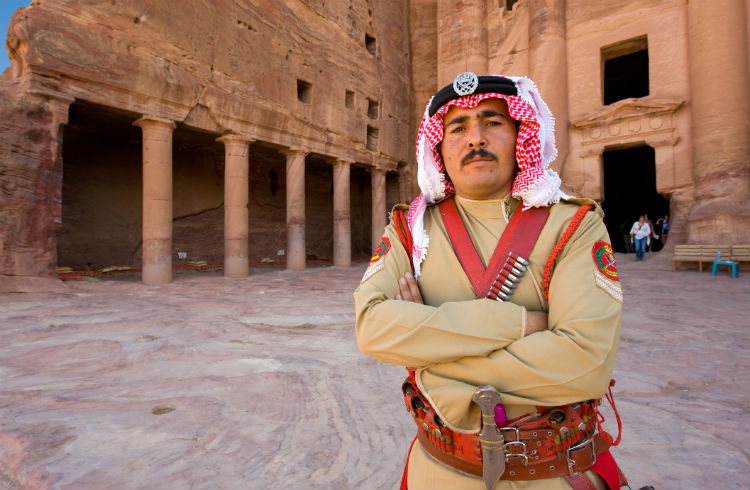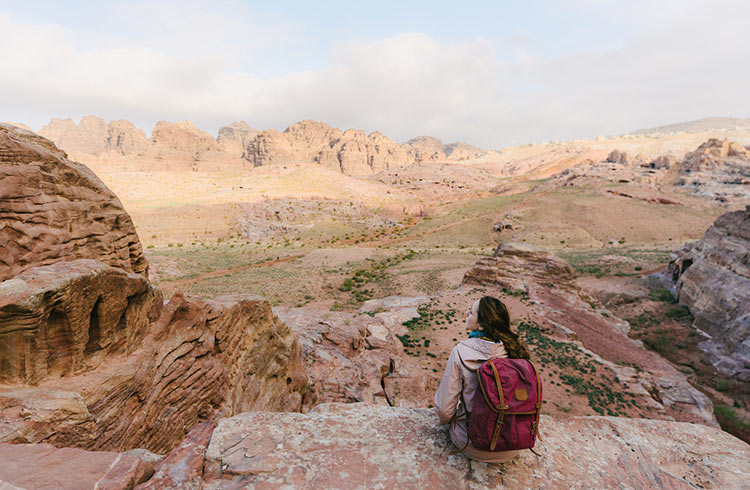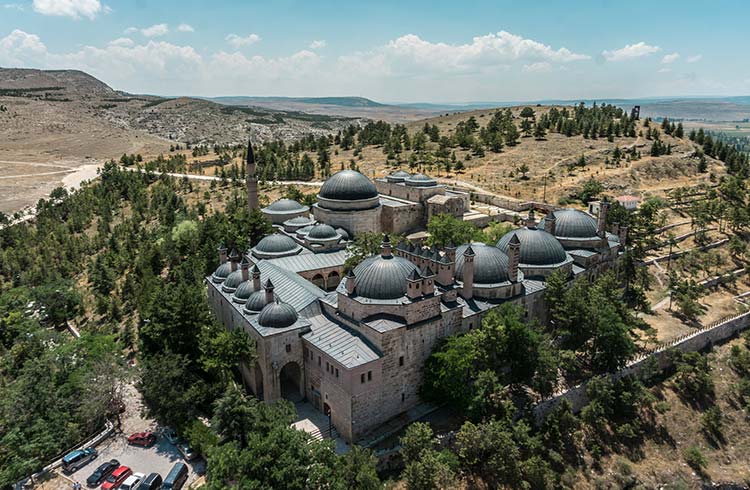Local Laws in Jordan: What Travelers Need to Know
Some of Jordan’s laws and customs may seem unfamiliar to visitors but it’s important to know about them – and respect them – during your visit. Here's what to know about Islam in Jordan, whether alcohol is legal, protocols around taking photos and more.
 Photo © iStock/nailzchap
Photo © iStock/nailzchap
Jordan may be one of the most progressive countries in the Middle East but as much of Jordanian law is rooted in its Arab-heritage Muslim tradition, some of the rules and customs may be unfamiliar to visitors. For a safe and smooth trip read up on these Jordan travel tips and familiarize yourself with local laws and customs.
Religion and faith in Jordan
It may come as no surprise that around 92% of Jordanians are Muslim (93% of them being Sunni Muslim). Consider that while Jordan may be home to one of the oldest Christian communities in the world (about 6% of the population is Christian), technically, it's illegal to encourage conversion to the Christian faith and certain sects of Christianity, such as Jehovah's Witnesses, are not even officially recognized as religions.
Also, if you happened to have read somewhere online that attempting to convert a Muslim is illegal in Jordan, well, that’s not really true. The Jordanian constitution and law do not explicitly ban Muslims from converting to another religion, and there are no penalties under civil law for doing so but Muslims who do convert to another religion face societal and governmental discrimination. It’s 100% okay to have conversations with Jordanians about various religions – talk about your own religion, ask questions about theirs, share, learn, and be merry – just don’t get too carried away.
Drugs, alcohol, and controlled substances
Contrary to popular belief, both visitors and locals are allowed to drink alcohol in some Middle Eastern countries and Jordan is one of them. While alcohol is, technically, considered a controlled substance in Jordan, fines for public intoxication or drinking outside a bar are far less serious than those for the possession, use, or trafficking of harder drugs.
If you attempt to bring marijuana, cocaine, heroin, or any other drug into the country and they’re discovered, the authorities could be very heavy-handed. Even if marijuana is legal in your home state or country and even if you have a doctor-issued medical marijuana prescription, know that it won’t be valid in Jordan so leave the recreational substances at home.
Driving in Jordan
It’s quite possible to get around the country by bus, ride share, private taxi, and shared taxi, but if you do plan on renting a car, keep in mind that, in Jordan, the driver is always considered guilty in an accident. A driver who is deemed guilty may have to cough up heavy compensation payments to other drivers and to pedestrians involved. Technically, the driver could also be imprisoned, but this rarely happens.
According to Ayman Abd Alkareem, the General Manager of the adventure travel company, Experience Jordan, Jordanians often say “the driver is always guilty” simply because it’s not easy to prove a pedestrian was at fault while crossing the road. According to Abd Alkareem, drivers are often found not-guilty in Jordan and he believes the phrase became popularized as a way to urge all drivers to drive carefully. Just like in other countries, when it comes to accidents between cars, the outcome can never be perfectly predicted and often depends on how insurance companies handle it.
Sexuality and LGBTQ+ travelers
Like most Muslim countries, homosexuality, the possession of pornographic material (even in the privacy of one’s home), and the consumption of alcohol outside of approved venues is not exactly celebrated in Jordan. And while the Middle East is definitely not leading the way in terms of LGBTQ+ rights, it’s also probably not as conservative as many people assume.
Homosexuality is legal in Jordan and the country even has a small LGBTQ+ movement, but public displays of affection (even between heterosexual couples) is frowned upon.
Jordanians living in large cities like Amman and Aqaba and in well-traveled places, such as Petra and Wadi Rum, are accustomed to seeing and meeting people from all different cultures and backgrounds. LGBTQ+ travelers do not typically have any issues in Jordan but they may draw some stares if they are affectionate in public. This is especially the case in rural areas and smaller villages.
Death sentence
Like many countries, including Singapore and the United States, Jordan also imposes the death penalty in the case of extremely serious offenses. Given that most travelers do not visit Jordan planning to commit treason or terrorism, this very likely will never apply to you but given that many Middle Eastern countries are often wrongly categorized as “extreme,” we wanted to break this down a bit. You will not risk death for wearing shorts, reading Western newspapers, or drinking alcohol in Jordan. That said, when there has been civil unrest in the region, the Jordanian government, like most governments, may be more anxious about foreigners speaking out against the status quo.
Sensitive photos
Taking pictures of government and military buildings in Jordan is forbidden, as it is in many places around the world. Are you sensing a theme here? The Middle East often gets a bad rap when it comes to security and customs but when you think about it, many of their rules also exist all over the world, including in English-speaking countries. If you do try to take a picture of a government building, you could get a stern warning, a fine, or a short imprisonment, depending on the mood of the guards.
Also, though it is technically not illegal, it's considered extremely rude (almost to the point of public indecency) to take a picture of someone without their consent. This is especially true of Bedouin women, who typically never consent to having their photo taken. Under absolutely no circumstances should you ever take a picture of a Bedouin woman without her permission but you may be given permission to photograph the woman’s hands. Come to think of it, it’s rude to take someone’s picture without asking anywhere in the world. If this is news to you, consider reviewing responsible photography tips before your trip.
Luggage searches
When you’re at the airport leaving Jordan, your luggage may undergo more security checks than you’re accustomed to. Not only are security officers typically looking for illegal drugs, but they are also looking to stop thoughtless visitors attempting to escape the country with precious antiquities.
Customs and manners in Jordan
For the most part, people are understanding and they won’t expect you to understand all the finer points of Jordanian customs and manners, though it will always be much appreciated if you attempt to learn. At a bare minimum, it is essential to respect how people live and worship even if it differs from your own experience, lifestyle, or personal beliefs.
If you visit places of religious significance, always display the utmost level of respect for whatever rules and customs are in place, regardless of your own political beliefs or religious philosophy. Dress modestly, behave courteously, and follow the lead of locals. The same goes if you visit during the holy month of Ramadan. Even if you do not observe fasting, you may be asked to not eat in front of those who are fasting. Do not be annoyed, do not try to talk your way out of it, and do not try to sneak food when nobody is looking. You are a guest and respecting the host is good manners in any country.
Related articles
Simple and flexible travel insurance
You can buy at home or while traveling, and claim online from anywhere in the world. With 150+ adventure activities covered and 24/7 emergency assistance.
Get a quote


3 Comments